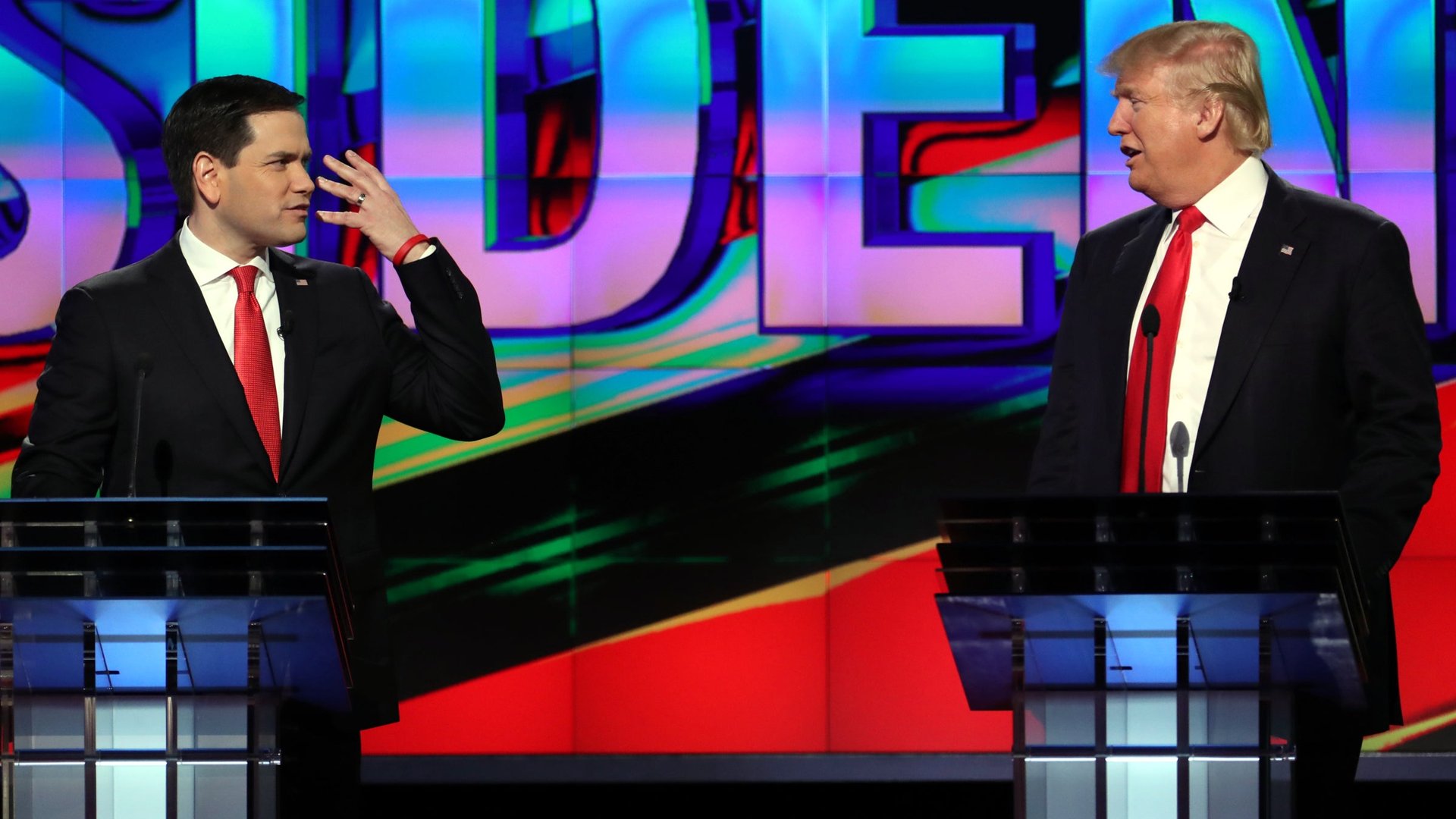Cuba explains why Trump is winning Florida—and Marco Rubio can’t believe it
On last night’s debate stage, two Cuban-American presidential candidates vied for the Republican party’s nomination in the decisive state of Florida, where about 9% of the Republican electorate is Cuban-American.


On last night’s debate stage, two Cuban-American presidential candidates vied for the Republican party’s nomination in the decisive state of Florida, where about 9% of the Republican electorate is Cuban-American.
President Barack Obama’s decision to move to re-establish diplomatic relations and trade with Cuba after decades of embargo isn’t breaking the way the Republicans expected—in part because a majority of Cuban Americans are ready for a change.
Historically, Cuban Americans—often exiles or from exile families—had pushed for a hard line on the Castro regime. But today, 56% of Cuban-Americans around the country back Obama’s decision, according to a poll taken at the end of 2015. And there is a generation gap: While those over 64 oppose the opening, younger Cubans are increasingly positive about it—perhaps because they are in a unique position to benefit.
And which Republican candidate is most welcoming of Obama’s decision? None other than frontrunner Donald Trump. Perhaps he imagines a Trump Tower in Havana and savors the back-and-forth of deal-making diplomacy. Or, as the moderators revealed, he doesn’t much understand Cuba policy at all.
But the impression of openness matters, because the 99 delegates awarded in Florida’s winner-take-all primary on March 15 could help decide the Republican race.
Florida senator Marco Rubio, the son of Cuban emigrants, has his political future on the line in his home state, but is losing to Trump.
Asked about Obama’s opening and a planned visit to the country later this month, Rubio criticized Trump for backing the president in allowing US companies to do business with the socialist government. Rubio compared the situation to Burma, also known as Myanmar, which was another heavily choreographed diplomatic engagement by the Obama administration.
Human rights advocates tend to argue that the sixty-year Cuban embargo did little more than give a repressive socialist government a convenient scapegoat for its problems. As Cuba toward a transition away from the Castro brothers, engagement may be the best way to influence Cuba’s next step. That hasn’t been easy: The two governments have continually butted heads over issues like contact with dissidents.
Meanwhile, business interests—from agricultural exporters in farm states to infrastructure builders like Caterpillar and telecommunication and tech firms like Google—see Cuba as an lucrative opportunity.
That in mind, you can imagine Trump likes the idea. But predictably, he told the audience he would get a “much better deal.” After waffling through an amazing colloquy with moderator Dana Bash, he finally admitted he would “probably have the embassy closed until such time as a really good deal was made.”
Of course, the embassy opening was a pre-condition to any deals being made, and the site of on-going negotiations over human rights and US and Cuban property claims. But Trump’s willingness to lean toward a common sense, even populist, solution drew the ire of Rubio and senator Ted Cruz, the other Cuban-American on stage.
Rubio shot back: “Here is a good deal. Cuba has free elections, Cuba stops putting people in jail for speaking out. Cuba has freedom of the press … And you know what? Then we can have a good relationship with Cuba. That’s a good deal.”
“His answer to everything is if only if someone smarter were in government, things would be better,” Cruz said. ”No. We don’t just need smarter people in government. We need leaders that are protecting American interests.”
The distinction that Cruz is drawing—that Trump wants a government that carries out his wishes, not the conservative vision of a small government for small government’s sake—essentially explains why Republicans are so astonished that Trump is winning. They thought their party’s voters wanted conservative ideology, but maybe they really want a brash loud-mouth who says what they think.
Maybe there’s a little Fidel in the Donald.